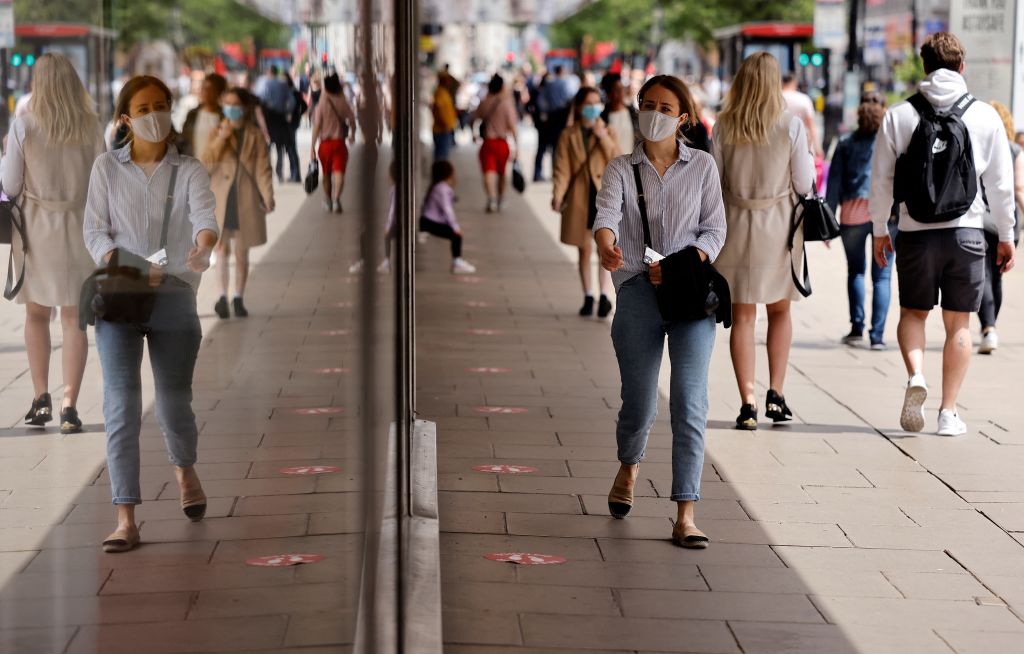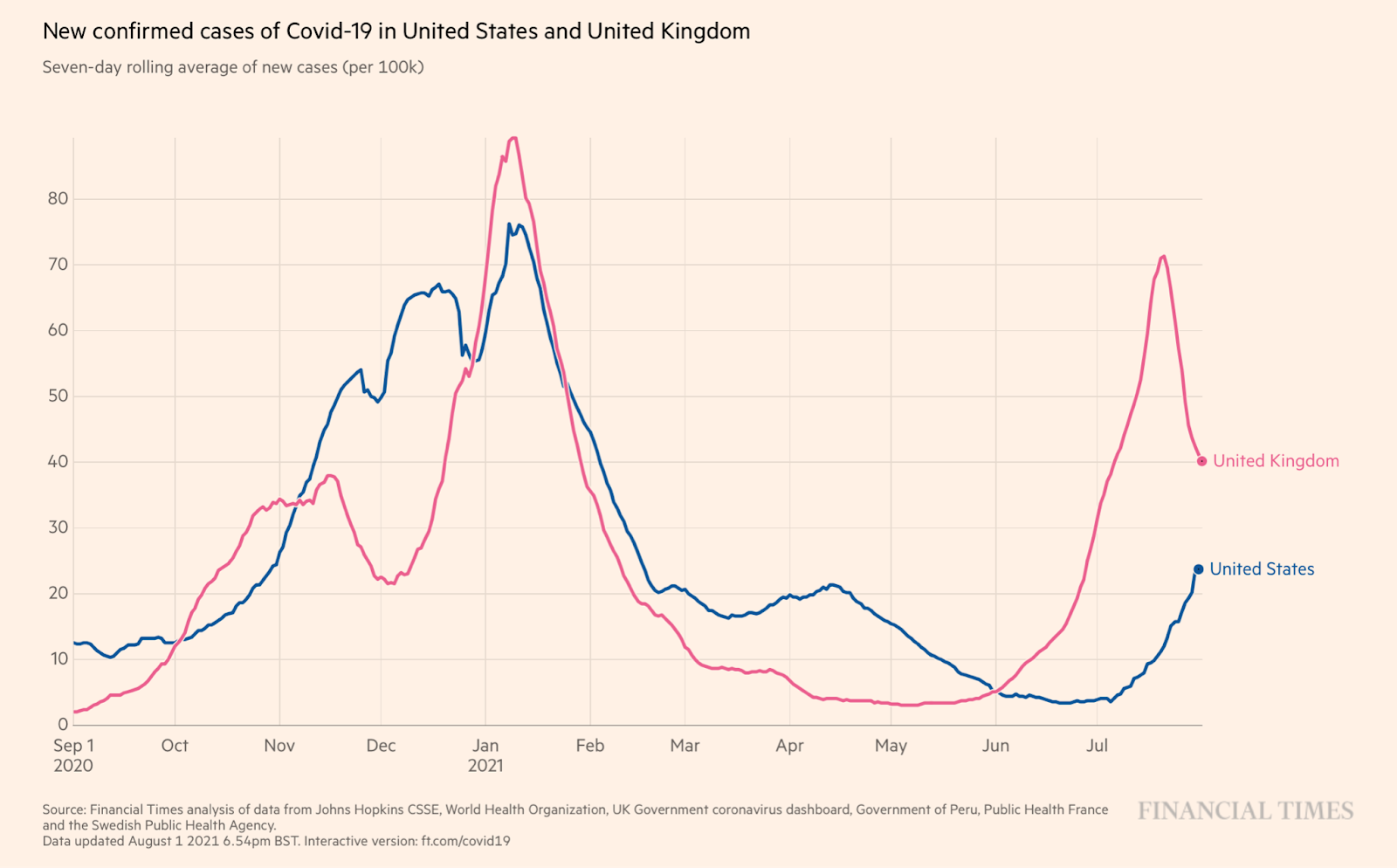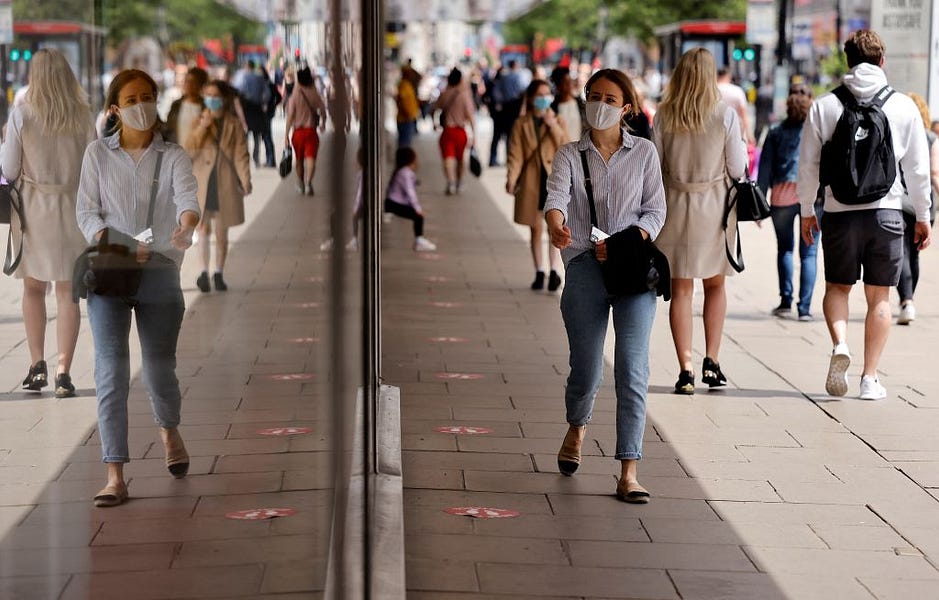Happy Monday! We promise to let you know if you ever have something on your chin.
Quick Hits: Today’s Top Stories
-
The federal eviction moratorium expired Saturday, two days after the Biden administration called on Congress to extend it. Democrats failed to muster enough support for retaining the policy, and Speaker Nancy Pelosi on Sunday night put the ball back in the White House’s court. “Action is needed, and it must come from the Administration,” a joint statement from House Democratic leaders read. The Supreme Court has signaled it would rule another extension of the policy through executive action unconstitutional.
-
American and British officials over the weekend formally blamed Iran for a drone strike last week on an oil tanker in the Arabian Sea. Iran has denied involvement in the attack—which killed two people—but Israeli officials believe the ship was targeted because it was managed by an Israeli company.
-
Protesters gathered in Paris and other French cities on Saturday in opposition to the “pass sanitaire” policy, leading to some skirmishes with police. The policy, which requires proof of COVID-19 vaccination, a negative test, or evidence of prior infection for entry into many public places, is set to be expanded next week.
-
At least 27 U.S. Attorneys’ offices had email communications breached as a result of last year’s SolarWinds cyberattack, the Justice Department announced Friday.
-
The Department of Justice is suing Texas over Gov. Greg Abbott’s recent order allowing state troopers to pull over, reroute, and/or seize vehicles carrying migrants they suspect of being infected with COVID-19.
-
In a ruling on Friday, the Department of Justice ordered the Treasury Department to submit former President Donald Trump’s tax returns to Congress, most likely marking the end of Trump’s legal battle to avoid making the records public.
-
Belarusian Olympic sprinter Krystsina Tsimanouskaya is seeking asylum in Europe after refusing to board a flight out of Tokyo on Sunday. After criticizing the “negligence” of Belarus’ athletics coaches, she was brought to the airport in what exiled opposition leader Sviatlana Tsikhanouskaya described as an attempted kidnapping.
-
Burma’s junta government—which overthrew the country’s elected leadership in a February coup—has extended the state of emergency it imposed when it came to power. Military leaders are now pledging to hold democratic elections within the next two years.
-
Tong Ying-kit—a 24-year-old Hong Kong protester who drove his motorcycle into police officers last summer—was sentenced to nine years in prison Friday, marking the first time a person was convicted under China’s new national-security law.
-
Going into the final week of Olympic competition, the U.S. maintains its slight lead in total medals with 61, over second-place China’s 58. China, however, continues to lead in gold medals: 28 compared to America’s 21.
A Quick Reminder That All Is Not Lost

In recent weeks, we haven’t been shy talking about the various ways the Delta variant is complicating America’s path back to normal life. But as case counts rise, some places begin to require masking again, and the public’s pandemic uneasiness grows, it’s important to be precise about what the current problems are and who most needs to worry about them. Unfortunately, a handful of bad headlines rocketed around the internet over the weekend, causing a lot more pandemic-related panic than is actually warranted.
-
From NBC News: “Exclusive: At least 125,000 fully vaccinated Americans tested positive for COVID.”
-
From the Washington Post: “Vaccinated people made up three-quarters of those infected in a massive Massachusetts covid-19 outbreak, pivotal CDC study finds.”
-
From the New York Times: “Breaking News: The Delta variant is as contagious as chickenpox and may be spread by vaccinated people as easily as the unvaccinated, an internal CDC report said.”
Just as an April 1865 article titled “President Lincoln has an unpleasant evening at Ford’s Theater” would be both technically true and wildly misleading, so, too, were these summaries of NBC’s more nuanced story on the same dataset and recent CDC documents. Reading the three headlines in quick succession, you’d be forgiven for thinking that the Delta variant has rendered our existing vaccines useless—but that couldn’t be further from the truth.
Let’s start with the 125,000 figure. What’s conveniently missing from that tweet-length snippet is a denominator: the total number of Americans who are fully vaccinated. According to the CDC, it’s currently 164,757,423. NBC’s tally of so-called “breakthrough cases” is likely an undercount, both because a few states didn’t provide updated data and some vaccinated people have likely been infected with COVID without being tested because they experienced no symptoms. But if we use their 125,000 figure as a baseline, that would mean 0.076 percent of fully vaccinated Americans (or 1 in 1,316) have experienced a breakthrough infection. As of July 26, per CDC data, 6,239 fully vaccinated Americans (0.004 percent) have been hospitalized with COVID-19, and 1,263 fully vaccinated Americans (0.001 percent) have died from it. The CDC classified 26 percent of those hospitalizations and 24 percent of those deaths as “asymptomatic or not related to COVID-19,” meaning the likelihood of severe breakthrough effects is even slimmer: 0.003 percent and 0.0006 percent, respectively.*
Again, the vaccines are almost assuredly not 99.924 percent effective against COVID for the reasons outlined above (both Pfizer and Moderna originally found their vaccines to be 95 percent effective against infection last fall), but that 125,000 number should be cause for celebration, not alarm.
The Washington Post headline, meanwhile, refers to a CDC report published Friday that, in part, led to the agency’s shifting message on masking last week. The study in question focused on an outbreak in Provincetown, Massachusetts, identifying 469 COVID-19 cases between July 3 and July 17. Of those 469, 346 (or 74 percent) occurred in fully vaccinated individuals, and approximately 90 percent of those who completed genomic sequencing were found to have the Delta variant. The cycle threshold values (viral load in people’s nose and mouth) were similar for both vaccinated and unvaccinated individuals who tested positive. Five people were hospitalized (four of them fully vaccinated) and none died.
“Findings from this investigation suggest that even jurisdictions without substantial or high COVID-19 transmission might consider expanding prevention strategies,” the study’s authors wrote, “including masking in indoor public settings regardless of vaccination status, given the potential risk of infection during attendance at large public gatherings that include travelers from many areas with differing levels of transmission.”
The study is significant, in that it shows fully vaccinated individuals are more capable of infecting others once they have a breakthrough infection themselves than previously understood. But because it too is missing a denominator for reference, it doesn’t say much about the likelihood of these breakthrough infections.
Ingu Yun, a retired doctor, was in Provincetown that weekend, and shared some criticisms of the CDC study in a Medium post that was subsequently endorsed by Dr. Bob Wachter, the chair of University of California San Francisco’s Department of Medicine, and Dr. Monica Gandhi, a UCSF infectious disease expert with whom we spoke last week. Yun noted that approximately 95 percent of very liberal Provincetown has received at least one vaccine dose, and noted it is a resort town on which tens of thousands of people descend to pack themselves into poorly ventilated bars and clubs every day.
“There were 60,000 visitors to Provincetown during the period in question. That would translate to 57,000 vaccinated folks and 3,000 unvaccinated folks,” he wrote. “How many tested positive for COVID? Current reports say about 750 vaccinated folks and 250 unvaccinated. This means that 750/57000 vaccinated folks tested positive, or 1.3 [percent]. 250/3000 unvaccinated folks tested positive, or 8.3 [percent].” These are, of course, rough estimates, but they should be encouraging for the fully vaccinated.
We could break down the New York Times story, too, but we’re running out of room here and it follows a similar theme. A leaked internal CDC presentation showed that the Delta variant is highly transmissible among unvaccinated people, and there is evidence that the very small percentage of fully vaccinated people experiencing breakthrough cases can transmit it as well.
All of this is not to dismiss the very real threat the Delta variant poses to unvaccinated individuals and the country at large. By The Dispatch’s count, the average number of COVID-19 cases confirmed every day jumped from 52,000 two weeks ago to 79,000 last week (52 percent increase week-over-week). Hospitalizations are on the rise, too: 24,252 last Sunday, 35,457 yesterday (46 percent increase). But because such a high proportion of the older population has been vaccinated (90 percent of those over 65 have received at least one dose), the average number of deaths attributed to COVID-19 has only jumped from 268 to 333 (24 percent increase).
If the United States’ experience with the Delta variant follows that of the United Kingdom—and it typically has—our peak in new cases should come at some point in the next one or two weeks, per former FDA Commissioner Dr. Scott Gottlieb.

Speaking on CBS News’ Face the Nation yesterday, Gottlieb made the case against Delta panic. “Remember, the original premise behind these vaccines were that they would substantially reduce the risk of death and severe disease and hospitalization. … That premise is still fully intact,” he said. “The second premise around these vaccines is that they would reduce the incidence of infection … and they can also reduce the risk of transmission. … That premise is still intact. But what we see with the Delta variant is it’s diminished. There is more evidence that people are likely to spread the Delta variant even after vaccination than they were likely to spread the other variants. But it’s still a very small percentage of people.”
Whether it’s messages like that or the increasing prevalence of mandates, vaccination trends are starting ever so slightly to reverse again. The week ending July 25, an average of 582,700 vaccine doses were administered every day in the United States. The following week, it was 662,500. Nearly 860,000 were reported on Friday, the highest tally in about four weeks. About 563,000 of those shots went to people starting the vaccination process and receiving their first dose.
Worth Your Time
-
In The New Atlantis, social science professor Taylor Dotson reflects on how our political culture’s obsession with facts is fundamentally at odds with the uncertainty inherent in “open” democratic societies. “Seeking expert advice and questioning the motivations of experts are both valuable instincts,” he writes. “But a fact-ist political culture transforms those instincts into intransigent political worldviews. Scientism and conspiracism promise a world where politics is steered by only those with the right minds or those with a pure relationship with power. They seek a society closed to political disagreement. These yearnings forget that if democracy achieves something like truth, it does so only by making politics work for the broadest possible membership of society.”
-
In Mother Jones, Kevin Drum tries to find an explanation for why Americans seem so angry nowadays. “Who or what are we angry at? Pandemic stresses aside, I’d bet you’re not especially angry at your family. Or your friends. Or your priest or your plumber or your postal carrier. Or even your boss. Unless, of course, the conversation turns to politics,” he writes. “When did this all start? Here are a few data points to consider. From 1994 to 2000, according to the Pew Research Center, only 16 percent of Democrats held a ‘very unfavorable’ view of Republicans, but then these feelings started to climb. Between 2000 and 2014 it rose to 38 percent and by 2021 it was about 52 percent. And the same is true in reverse for Republicans: The share who intensely dislike Democrats went from 17 percent to 43 percent to about 52 percent.”
Presented Without Comment
Also Presented Without Comment
Toeing the Company Line
-
Turns out the Chicago Cubs’ Anthony Rizzo trade was only the beginning, with the team shipping off Kris Bryant and Javier Báez on Friday afternoon as well. Declan tried to get all his emotions down on paper in a piece for the site on Saturday. “For nearly a decade, that trio made up the core of the greatest chapter in Cubs baseball history,” he writes. “Summer after summer—night in, night out—tens of thousands of fans made the trek to the corner of Clark and Addison to experience the magic for themselves, and hundreds of thousands more beamed it into their living rooms. People went off to college, lost loved ones, had children, fell into and out of love. But on good days and bad, Rizz, KB, and El Mago were there, giving it their all. And most of the time, that was enough.”
-
Harvest and Ryan broke down the latest infrastructure news in Friday’s Uphill, writing about how—despite some opposition from both Republicans and progressives—the bipartisan package may yet become law.
-
In Friday’s G-File, Jonah laments the culture war obsession with potentially offensive vocabulary, to the neglect of more pressing issues. “New language won’t make bad schools good and crime-ridden neighborhoods safe,” he writes. “You can do a lot with words, but words are not magic. And if you think that home buyers—and mortgage lenders—won’t find other ways to get accurate information just because of some new mandate to make appraisals more difficult to parse, you’re not only foolish, you’re begging for punishment from the god of unintended consequences.”
-
In Sunday’s French Press, David responds to the “volcanic reaction” his recent piece on structural racism triggered, arguing his critics were responding to a point he never made. “That glow you saw on the horizon was the flames of a thousand burning straw men,” he writes. “But this misrepresentation does give me an opportunity to discuss a vitally important concept that’s often overlooked within the church—the difference between individual guilt and institutional responsibility, including the individual responsibility to correct the consequences of enduring institutional injustice.”
-
In last week’s Vital Interests (🔒), Thomas Joscelyn focuses on how Turkey’s government has failed to take action against terrorist organizations within the country’s borders. “Erdoğan’s security forces often announce raids on jihadist cells. But more often than not, it appears that Turkey is a safe haven for terrorists,” he writes. “Some have likened it to Pakistan, another nation nominally allied with the West that also harbors extremists. And just like Pakistan, the challenges posed by Turkey’s duplicity are not going away anytime soon.”
Let Us Know
Regarding that Kevin Drum piece, do you think our politics are actually more rage-filled now than ever before, or is our perception distorted by recency bias?
Reporting by Declan Garvey (@declanpgarvey), Andrew Egger (@EggerDC), Charlotte Lawson (@charlotteUVA), Ryan Brown (@RyanP_Brown), Harvest Prude (@HarvestPrude), Tripp Grebe (@tripper_grebe), Emma Rogers (@emw_96), Price St. Clair (@PriceStClair1), Jonathan Chew (@JonathanChew19), and Steve Hayes (@stephenfhayes).
* Clarification, August 2, 2021: This newsletter has been updated to reflect a footnote in the CDC’s data on breakthrough COVID-19 infections that classifies about a quarter of breakthrough hospitalizations and deaths as “not related” to COVID-19.







Please note that we at The Dispatch hold ourselves, our work, and our commenters to a higher standard than other places on the internet. We welcome comments that foster genuine debate or discussion—including comments critical of us or our work—but responses that include ad hominem attacks on fellow Dispatch members or are intended to stoke fear and anger may be moderated.
You are currently using a limited time guest pass and do not have access to commenting. Consider subscribing to join the conversation.
With your membership, you only have the ability to comment on The Morning Dispatch articles. Consider upgrading to join the conversation everywhere.